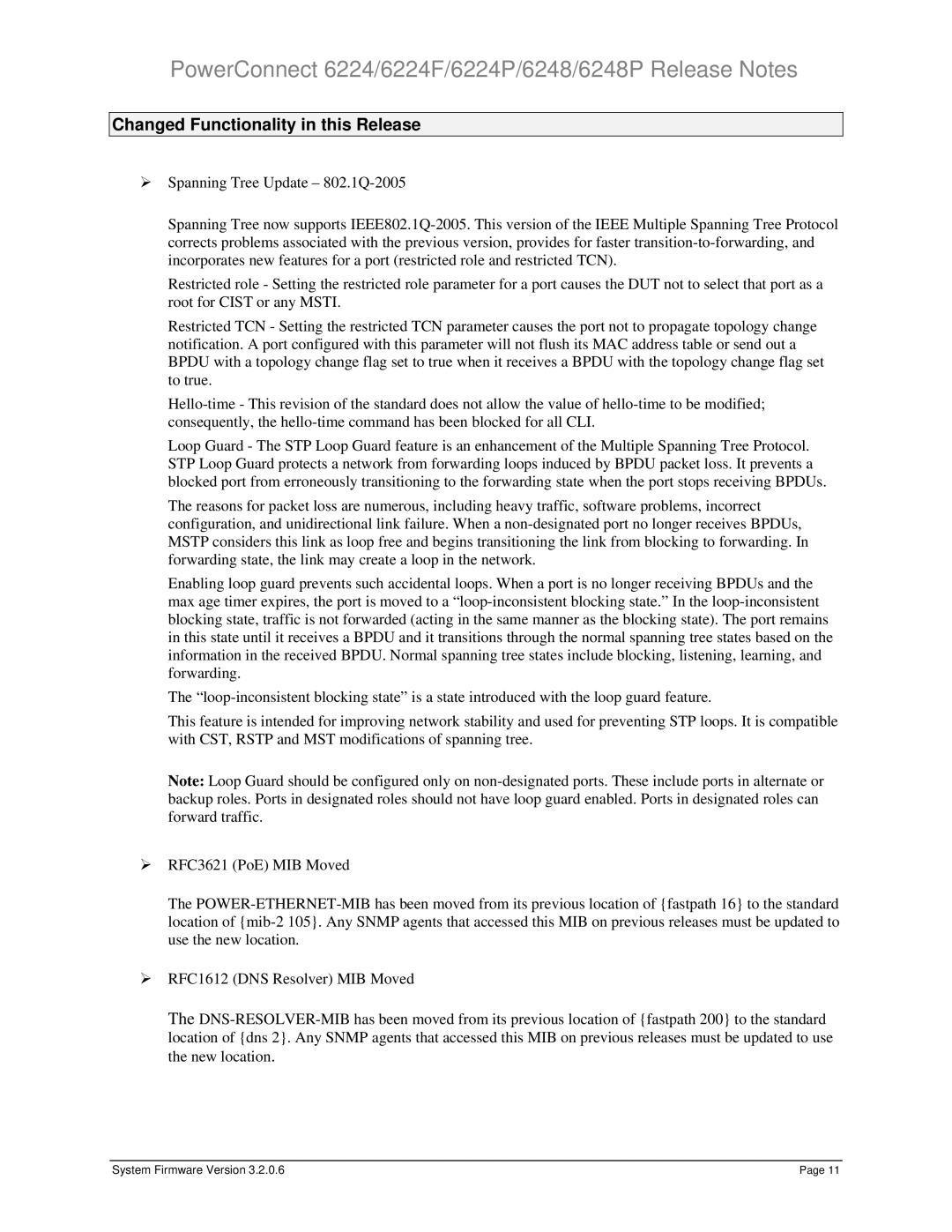PowerConnect 6224/6224F/6224P/6248/6248P Release Notes
Changed Functionality in this Release
¾Spanning Tree Update – 802.1Q-2005
Spanning Tree now supports IEEE802.1Q-2005. This version of the IEEE Multiple Spanning Tree Protocol corrects problems associated with the previous version, provides for faster transition-to-forwarding, and incorporates new features for a port (restricted role and restricted TCN).
Restricted role - Setting the restricted role parameter for a port causes the DUT not to select that port as a root for CIST or any MSTI.
Restricted TCN - Setting the restricted TCN parameter causes the port not to propagate topology change notification. A port configured with this parameter will not flush its MAC address table or send out a BPDU with a topology change flag set to true when it receives a BPDU with the topology change flag set to true.
Hello-time - This revision of the standard does not allow the value of hello-time to be modified; consequently, the hello-time command has been blocked for all CLI.
Loop Guard - The STP Loop Guard feature is an enhancement of the Multiple Spanning Tree Protocol. STP Loop Guard protects a network from forwarding loops induced by BPDU packet loss. It prevents a blocked port from erroneously transitioning to the forwarding state when the port stops receiving BPDUs.
The reasons for packet loss are numerous, including heavy traffic, software problems, incorrect configuration, and unidirectional link failure. When a non-designated port no longer receives BPDUs, MSTP considers this link as loop free and begins transitioning the link from blocking to forwarding. In forwarding state, the link may create a loop in the network.
Enabling loop guard prevents such accidental loops. When a port is no longer receiving BPDUs and the max age timer expires, the port is moved to a “loop-inconsistent blocking state.” In the loop-inconsistent blocking state, traffic is not forwarded (acting in the same manner as the blocking state). The port remains in this state until it receives a BPDU and it transitions through the normal spanning tree states based on the information in the received BPDU. Normal spanning tree states include blocking, listening, learning, and forwarding.
The “loop-inconsistent blocking state” is a state introduced with the loop guard feature.
This feature is intended for improving network stability and used for preventing STP loops. It is compatible with CST, RSTP and MST modifications of spanning tree.
Note: Loop Guard should be configured only on non-designated ports. These include ports in alternate or backup roles. Ports in designated roles should not have loop guard enabled. Ports in designated roles can forward traffic.
¾RFC3621 (PoE) MIB Moved
The POWER-ETHERNET-MIB has been moved from its previous location of {fastpath 16} to the standard location of {mib-2 105}. Any SNMP agents that accessed this MIB on previous releases must be updated to use the new location.
¾RFC1612 (DNS Resolver) MIB Moved
The DNS-RESOLVER-MIB has been moved from its previous location of {fastpath 200} to the standard location of {dns 2}. Any SNMP agents that accessed this MIB on previous releases must be updated to use the new location.

